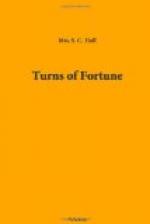“Refuse her old lover under present circumstances,” repeated her cousin to herself as she left the room; “there must be some other reason than that; she could not be so foolish as to reject such an offer at such a time.” Unfortunately, she saw Edwin Lechmere walking by Mary’s side, under the shadow of some trees. She watched them until the foliage screened them from her sight, and then she shut herself into her own room, and yielded to a long and violent burst of tears. “It is not enough,” she exclaimed, in the bitterness of her feelings, “that the comforts of my parents’ declining years should be abridged by the overwhelming burden to their exertions—another family added to their own; it is not enough that an uncomfortable feeling has grown between my father and mother on this account, and that cold looks and sharp words have come where they never came before, but my peace of mind must be destroyed. Gladly would I have taken a smaller portion, if I could have kept the affections which I see but too plainly my cousin has stolen from me. And my thoughtless aunt to say, only yesterday, that ’at all events her husband was no man’s enemy but his own.’ Has not his want of prudent forethought been the ruin of his own children? and will my parents ever recover the anxiety, the pain, the sacrifices, brought on by one man’s culpable neglect? Oh, uncle! if you could look from your grave upon the misery you have caused!”—and then, exhausted by her own emotion, the affectionate but jealous girl began to question herself as to what she should do. After what she considered mature deliberation, she made up her mind to upbraid her cousin with treachery, and she put her design into execution that same evening.
It was no easy matter to oblige her cousin to understand what she meant; but at last the declaration that she had refused her old lover because she had placed her affections upon Edwin Lechmere, whom she was endeavouring to “entrap,” was not to be mistaken; and the country girl was altogether unprepared for the burst of indignant feeling, mingled with much bitterness, which repelled the untruth. A strong fit of hysterics, into which Mary Charles worked herself, was terminated by a scene of the most painful kind, her father being upbraided by her mother with “loving other people’s children better than his own,” while the curate himself knelt by the side of his betrothed, assuring her of his unaltered affection. From such a scene Miss Adams hastened with a throbbing brow and a bursting heart. She had no one to counsel or console her; no one to whom she could apply for aid. For the first time since she had experienced her uncle’s tenderness, she felt she had been the means of disturbing his domestic peace; the knowledge of the burden she and hers were considered, weighed her to the earth; and in a paroxysm of anguish she fell on her knees, exclaiming, “Oh, why are the dependent born into the world! Father, father, why did you leave




